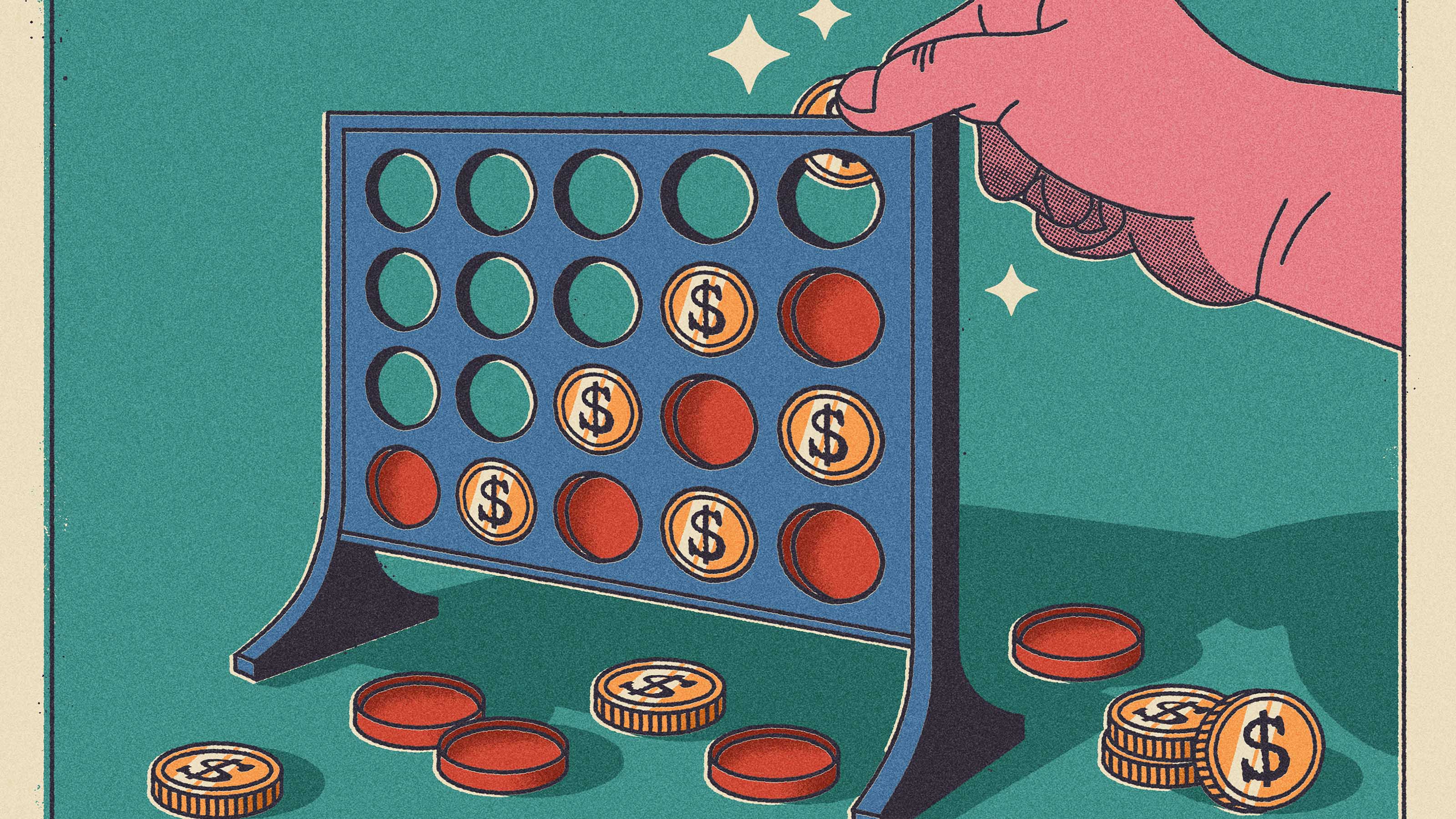How Overpaid CEOs Hurt Investors
If more companies spread their wealth beyond the boardroom, they'd improve their bottom lines.

Profit and prosper with the best of Kiplinger's advice on investing, taxes, retirement, personal finance and much more. Delivered daily. Enter your email in the box and click Sign Me Up.
You are now subscribed
Your newsletter sign-up was successful
Want to add more newsletters?

Delivered daily
Kiplinger Today
Profit and prosper with the best of Kiplinger's advice on investing, taxes, retirement, personal finance and much more delivered daily. Smart money moves start here.

Sent five days a week
Kiplinger A Step Ahead
Get practical help to make better financial decisions in your everyday life, from spending to savings on top deals.

Delivered daily
Kiplinger Closing Bell
Get today's biggest financial and investing headlines delivered to your inbox every day the U.S. stock market is open.

Sent twice a week
Kiplinger Adviser Intel
Financial pros across the country share best practices and fresh tactics to preserve and grow your wealth.

Delivered weekly
Kiplinger Tax Tips
Trim your federal and state tax bills with practical tax-planning and tax-cutting strategies.

Sent twice a week
Kiplinger Retirement Tips
Your twice-a-week guide to planning and enjoying a financially secure and richly rewarding retirement

Sent bimonthly.
Kiplinger Adviser Angle
Insights for advisers, wealth managers and other financial professionals.

Sent twice a week
Kiplinger Investing Weekly
Your twice-a-week roundup of promising stocks, funds, companies and industries you should consider, ones you should avoid, and why.

Sent weekly for six weeks
Kiplinger Invest for Retirement
Your step-by-step six-part series on how to invest for retirement, from devising a successful strategy to exactly which investments to choose.
Years ago, when I started writing articles critical of exorbitant executive pay, some readers accused me of being a communist. In truth, I’m a die-hard capitalist. But I believe soaring executive pay is helping to fuel income inequality and is a threat to shareholders and the economy. A growing body of research supports this theory, so I thought it time to explain my views.
You expect some income inequality in a capitalist economic system. But inequality becomes a negative when it reaches extreme levels, and the situation in the U.S. is “approaching that threshold,” Standard & Poor’s says in a recent report.
The distribution of income isn’t just about fairness. John Maynard Keynes, one of the fathers of modern economics, posited that extreme income inequality could lead to long stretches of high unemployment. Extreme inequality is characterized by stagnant or falling income among the poor and middle class, which causes vast numbers of people to spend less and leads to diminishing demand. If demand is inadequate to snap up the available supply of any given good or service, the price of the item will fall. If the price falls far enough, it will drop below the cost of production. Production then ceases, workers are furloughed, and demand falls further.
From just $107.88 $24.99 for Kiplinger Personal Finance
Become a smarter, better informed investor. Subscribe from just $107.88 $24.99, plus get up to 4 Special Issues

Sign up for Kiplinger’s Free Newsletters
Profit and prosper with the best of expert advice on investing, taxes, retirement, personal finance and more - straight to your e-mail.
Profit and prosper with the best of expert advice - straight to your e-mail.
Keynes encouraged governments to use fiscal and monetary policy to spur demand to avoid this downward spiral. His theories formed the basis for the policies that the U.S. government employed to prevent the Great Recession from morphing into a depression. Most prominently, the Federal Reserve has used its monetary tools to drive interest rates to rock-bottom levels.
But monetary policy can only take you so far, as Japan has painfully demonstrated over the past quarter-century. What’s needed to goose the economy is a surge in consumer spending, which accounts for more than two-thirds of U.S. economic activity. But too many Americans are keeping a tight grip on their wallets.
Why aren’t Americans shopping more? They can’t afford to. A recent analysis by the Congressional Budget Office found that income for 90% of the population is growing at an anemic annual rate of 1%. The Census Bureau estimates that overall inflation-adjusted income increased a tepid 0.2% in 2011 and 2012, but it declined for everyone but the top 20% of earners.
Keynes figured that people would borrow to buy. But because Americans are still digging out of the debt hole that nearly wrecked the economy in 2008, many simply can’t. To spend more, they must earn more.
Exorbitant pay. It may be difficult for small businesses to boost wages, but the same can’t be said about large, cash-flush publicly traded companies. Unfortunately, too many companies distribute their wealth in economically inefficient ways. Consider software giant Oracle. For the fiscal year that ended in May 2013, then-CEO Larry Ellison declined cash pay. But Oracle lavished him with 7 million stock options with an estimated value of $77 million at the time of the grant. Given that Ellison, 70, has a net worth of some $50 billion, it’s hard to argue that he’ll work harder because of an additional $77 million in pay. He’d make more by earning a piddling 0.2% on his billions.
But if Oracle divided the value of those 7 million options among its 122,000 employees, each would get 57 shares, which would be worth $663 today. That could give two or three football stadiums full of people the incentive to head to the mall. By giving that money to super-rich executives like Ellison rather than spreading it more equitably among the rank and file, businesses make it difficult for their employees to spend on anything but bare necessities. The entire U.S. economy pays the price.
Profit and prosper with the best of Kiplinger's advice on investing, taxes, retirement, personal finance and much more. Delivered daily. Enter your email in the box and click Sign Me Up.

-
 Dow Adds 1,206 Points to Top 50,000: Stock Market Today
Dow Adds 1,206 Points to Top 50,000: Stock Market TodayThe S&P 500 and Nasdaq also had strong finishes to a volatile week, with beaten-down tech stocks outperforming.
-
 Ask the Tax Editor: Federal Income Tax Deductions
Ask the Tax Editor: Federal Income Tax DeductionsAsk the Editor In this week's Ask the Editor Q&A, Joy Taylor answers questions on federal income tax deductions
-
 States With No-Fault Car Insurance Laws (and How No-Fault Car Insurance Works)
States With No-Fault Car Insurance Laws (and How No-Fault Car Insurance Works)A breakdown of the confusing rules around no-fault car insurance in every state where it exists.
-
 The Most Tax-Friendly States for Investing in 2025 (Hint: There Are Two)
The Most Tax-Friendly States for Investing in 2025 (Hint: There Are Two)State Taxes Living in one of these places could lower your 2025 investment taxes — especially if you invest in real estate.
-
 The Final Countdown for Retirees with Investment Income
The Final Countdown for Retirees with Investment IncomeRetirement Tax Don’t assume Social Security withholding is enough. Some retirement income may require a quarterly estimated tax payment by the September 15 deadline.
-
 How to Beef Up Your Portfolio Against Inflation
How to Beef Up Your Portfolio Against Inflationinvesting These sectors are better positioned to benefit from rising prices.
-
 Taxable or Tax-Deferred Account: How to Pick
Taxable or Tax-Deferred Account: How to PickInvesting for Income Use our guide to decide which assets belong in a taxable account and which go into a tax-advantaged account.
-
 Smart Investing in a Bear Market
Smart Investing in a Bear Marketinvesting Here's how to make the most of today’s dicey market.
-
 How to Open a Stock Market Account
How to Open a Stock Market Accountinvesting Investing can be fun, but you need a brokerage account to do it. Fortunately, it’s easy to get started.
-
 The Right Dividend Stock Fund for You
The Right Dividend Stock Fund for YouBecoming an Investor Dividend stock strategies come in many different flavors. Here's what to look for.
-
 Alternative Investments for the Rest of Us
Alternative Investments for the Rest of UsFinancial Planning These portfolio diversifiers aren't just for the wealthy.